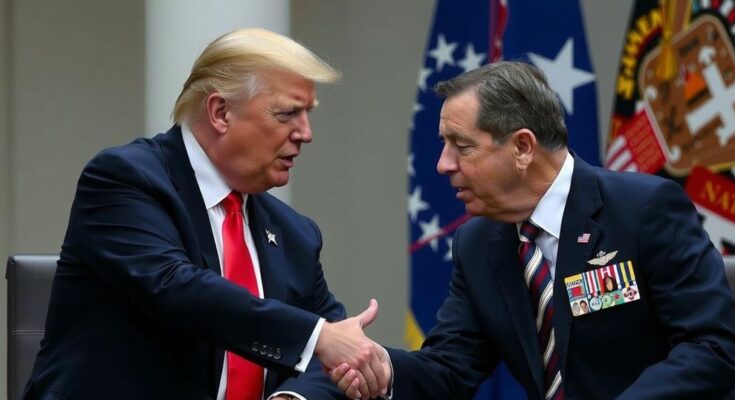President-elect Donald Trump met with NATO Secretary General Mark Rutte in Florida, discussing global security challenges, particularly concerning North Korea and Russia. The meeting highlights ongoing concerns about U.S. military aid for Ukraine and the implications for transatlantic relations as threats evolve.
On Friday, United States President-elect Donald Trump conducted his inaugural meeting with NATO Secretary General Mark Rutte in Florida. This discussion primarily revolved around pressing global security concerns faced by the NATO alliance. As highlighted by spokesman Farah Dakhlallah, this pivotal meeting took place shortly after Trump’s election, focusing on pertinent international threats, particularly the growing ties among North Korea, Russia, and other nations.
During his initial term, President Trump had been vocal about encouraging European nations to increase their defense budgets, often questioning the equity of the NATO partnership. Rutte, having expressed a desire to engage with Trump immediately following the election, underscored the urgency of addressing the escalating alliances among adversarial countries. Following Trump’s electoral victory, apprehensions in Europe have heightened regarding the potential withdrawal of crucial U.S. military aid to Ukraine, complicating the European security landscape.
Moreover, Rutte remarked on the intricate dynamics among nations such as North Korea and Russia, asserting that they are increasingly collaborating against Ukraine. He further noted that Russia’s technological support for North Korea poses significant threats not only to America but also to continental Europe. Rutte expressed optimism about collaborating with Trump to devise strategies to counter these looming global threats.
The article highlights a significant meeting between U.S. President-elect Donald Trump and NATO Secretary General Mark Rutte, post-Trump’s electoral victory. This interaction comes at a crucial time as NATO faces numerous global security challenges, particularly regarding the relationships among North Korea, Russia, and their potential impact on European and American safety. Historically, Trump’s presidency saw tensions rise around NATO’s defense spending commitments, prompting concerns in Europe regarding U.S. support for allies like Ukraine amid heightened threats from Russia.
In summary, the recent meeting between President-elect Trump and NATO Secretary General Rutte underscores the critical need for diplomatic engagement among NATO allies in addressing emerging security threats. As concerns mount over the alliances between countries such as North Korea and Russia, continued dialogue will be essential in maintaining transatlantic security cooperation. Moreover, the implications of Trump’s approach to NATO could profoundly impact military support to Europe and alliances moving forward.
Original Source: www.france24.com




